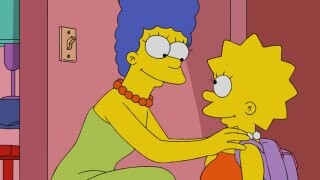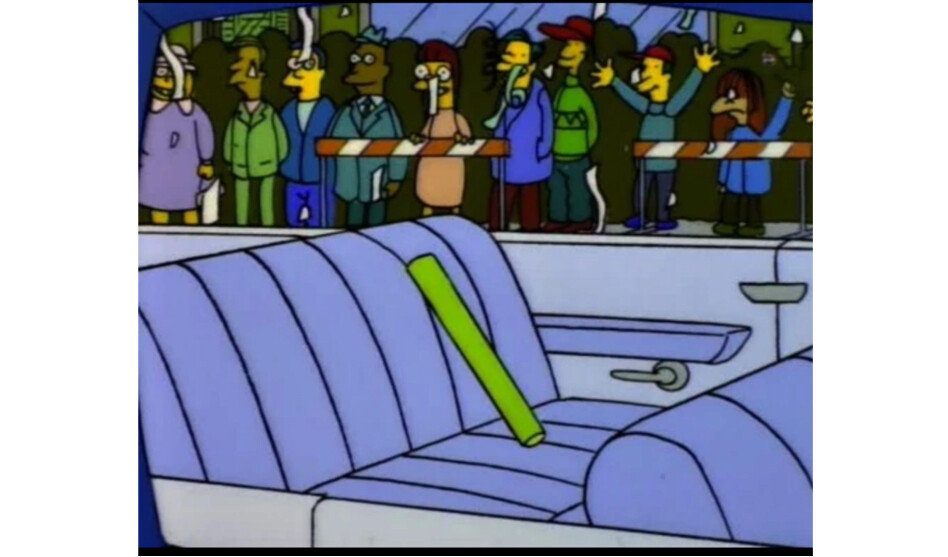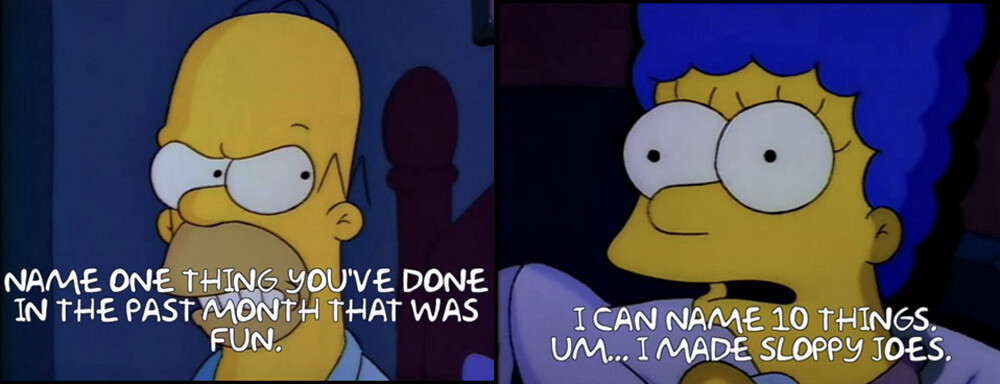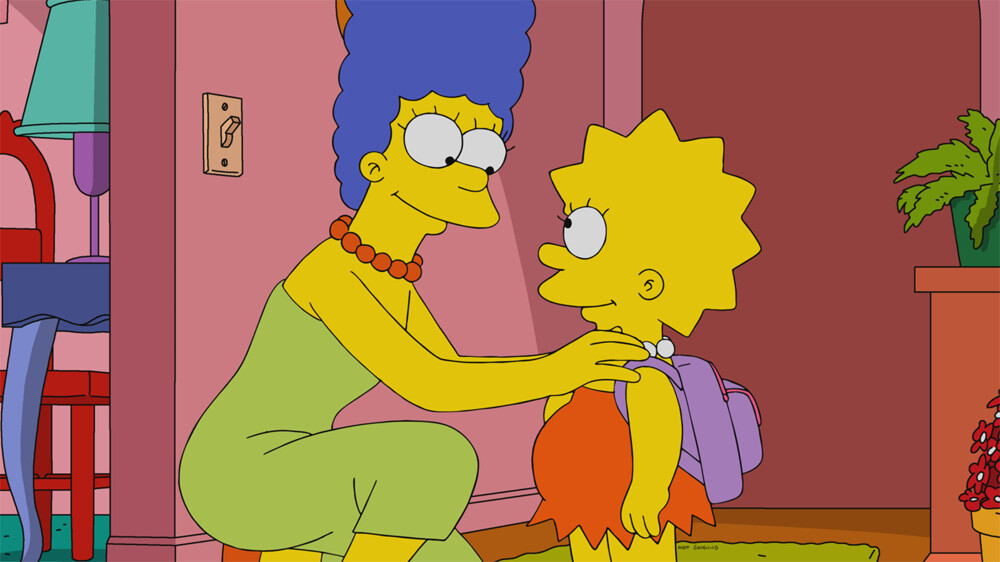Marge Simpson And The Importance Of The Straight Woman

It's no exaggeration to say that The Simpsons has influenced every writer you've ever read on this site (or any other comedy site). So this week, Cracked is taking a closer look at the town of Springfield and all of our favorite residents ...
If The Simpsons evoke feelings of '90s nostalgia for you, we invite you to enter to win one of three advanced copies of "The Nineties: A Book" by Chuck Klosterman, courtesy of Penguin Random House. Submit your email below to enter and learn more here.
Don't Miss
You're going to read a lot of articles during Simpsons week here at Cracked touting the importance of specific characters, but while every Simpsons character puts in their fair share to the show's success, it simply could not work without arguably its most important character.

Uh, no, we're talking about Marge Simpson.
On the surface, Marge is a literal nuclear housewife, being that she is married to a nuclear ("Nuculear, it's pronounced nuculear!") technician. A stay-at-home mother of three (which frankly is nigh-impossible by today's economic standards) is a consistent trope within the great history of American sitcoms. Except for certain episodes when she becomes a cop, a steroid-addled bodybuilder, or an MMA fighter, Marge is grounded and straight-laced for the bulk of the Simpsons catalog. While all of that is true, her character's "straight woman" persona is more unique than other sitcom wives during the last 30+ years.
Marge is the mortar that keeps each zany brick of The Simpsons foundation together. While the relationships between characters ebb and flow throughout an episode, Marge is the only character in the Simpson family that every family member loves and respects as the default setting at the start of each story.

Fox
Bart and Lisa would bicker, Homer and Bart would have a Tom & Jerry dynamic, and Lisa would be frustrated at Homer's lack of understanding or attempt thereof, especially in the early seasons. While she is often taken for granted, Marge has no initial antagonism among any other Simpson family members. Homer loves her. Bart hates disappointing her. Lisa sees a person she can come to that will at least attempt to empathize with her. Maggie, being a baby, depends on her. Without Marge, there is little reason for the characters to stay connected or rally around one another from the start.
Harsh critics would decry that "But Marge is boring," and while they have the right to that opinion, that opinion is boring. At the writers' worst, Marge is a nag and essentially a Frank Grimes that "yes anded" an episode's plot no matter how absurd. However, the genius behind Marge isn't her ability to allow the oddness of Homer becoming an astronaut, Bart owning an elephant, or Lisa ruling Springfield alongside other members of a local Mensa chapter. It's her fascination with the mundane.

Fox
Marge's fixation on the mundane aspects of life provides a wonderful, hilarious contrast to the adventures the other characters experience with a slice of relatability thrown in. Many mothers, including my own, had the "Well, if loving my kids is lame, I guess I'm just a big lame" mentality. If you could sum up Marge in two quotes, it would be "Fruit is nature's candy!" followed up with "Look out for the Shaq attack!"

Fox
But while Marge's roles as the straight woman and glue of the show's main cast are important, her uniqueness is that she's got more than those dimensions. She has her own dreams, goals, and adventures outside of the needs of the rest of the family. Whenever she feels "trapped" or has an outside interest, she pursues it, whether it is to play Blanche DuBois in a musical or sell pretzels. Whenever she feels resentment at being the family caretaker, she voices it and takes a break from it.
Unlike many sitcom wives during the series' heyday, Marge was far from sexless, having just as big a libido as her husband. Physical intimacy is an important need for Marge, often discussing "snuggling" with Homer as an element of how their marriage works for them both, not just the stereotypical horny husband. This is one of many reasons—valid, invalid, and outright odd—that Marge had a photo spread for Playboy in 2009, even though most people who are horny for naked cartoon characters had access to DeviantArt since 2000.
Outside of the show, Marge is The Simpsons' strongest ambassador. At the peak of their initial success, then-First Lady Barbara Bush remarked that the show was "the dumbest thing I have ever seen," but this was before her President husband puked on the Prime Minister of Japan, and she's overlooking other things her husband did. Out of all the characters, the staff of The Simpsons chose Marge as their avatar to rebut Bush's statement, writing a letter in character and sending it to The White House.

Much to the surprise of many, the First Lady responded.

This letter exchange simmered down the feud between The Bushes and The Simpsons. Well, at least until they became neighbors.
But how has Marge influenced other television programs? People would likely cite other cartoon moms like Lois Griffin, Peggy Hill, and Sheila Broflovski, but the wife/mother character in a sitcom is a role that's existed in primetime animation since the modern stone age.

Hanna-Barbera
But Marge's mundane-quirked straight-person persona is better matched with current male characters in recent comedies, which in turn allow their women characters to be the more adventurous spectacle. Bob Belcher in Bob's Burgers sighs and begrudgingly goes along with Linda's latest zany venture or supports his kids' next odd goal, but revels in the simplicity of a well-cooked meal (even if he talks to ingredients out loud and replies on their behalf in a funny voice). Ben Wyatt's stuffed-shirt nature allows the more animated Leslie Knope to pursue more outlandish schemes in Parks & Recreation, yet he still has his quirky fixation on calzones and creating board games. Chidi plays straight towards Eleanor's plans in The Good Place but obsesses over whether he is bad because he drank almond milk. Beef in The Great North is the glue-like patriarch of the family who gushes over the banal hobbies of chopping wood and drinking hot milk.
So if the straight-person role is becoming more balanced both regarding gender and allowing comedic quirks so they can be more rounded than the prototypical straight man/woman, where does that leave Marge in the current day? What does she mean to us in the 2020s?
Well, it's rather difficult to say, as it's hard for a character like Marge to seem realistic or relevant in today's setting. From the ground up, she was an offshoot of a 1950s/1960s housewife from the beginning since she was based on Simpsons creator Matt Groening's own mother. There have been episodes that suggest a retcon to Homer and Marge being teens in the '90s to make the show seem more contemporary. Probably the most relatable animated TV mom today is Emily Ramirez of Close Enough, and you probably had to click that hyperlink or subscribe to HBOMax in order to know who I was talking about.
However, since The Simpsons has been around longer than most Cracked readers have been alive, Marge has been written by multiple generations at this point, each one carving their own experiences with their mothers into the character without compromising her (to varying levels of success). In the latest season, Marge and Lisa formed a stronger bond after facing issues regarding triggering words and body positivity, so she can still be used for relatable looks into current-day struggles and issues.

Fox
So while Marge isn't the most popular Simpson character, she doesn't have to be. She never did. But Homer could never reason with a First Lady.
Her purpose in the overall Simpsons narrative allows the other characters to bounce and shine, while she was able to showcase some quality stories and a personality on her own, too. She is the ultimate straight person, especially since she fits that role in one of the longest-running television programs of all time. And if thinking that makes me lame, well …
Top Image: 20th Television
